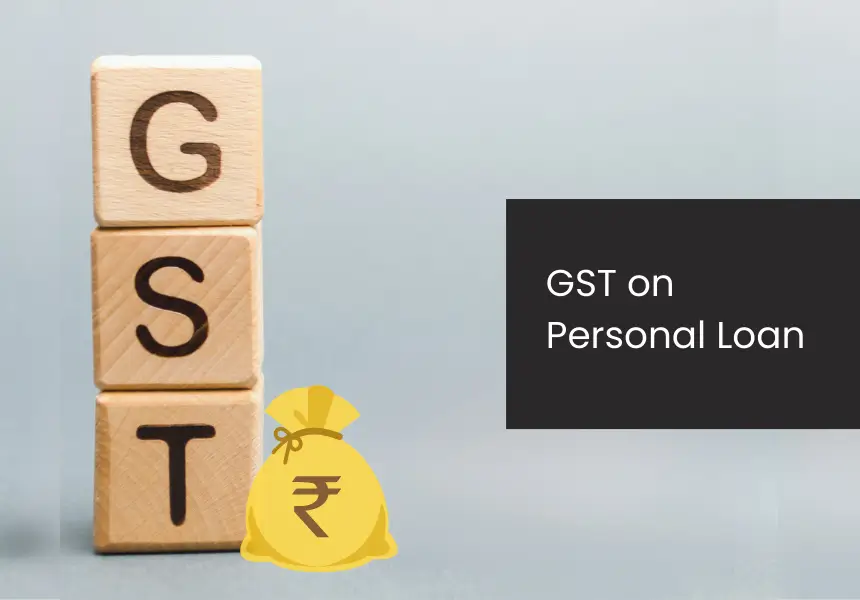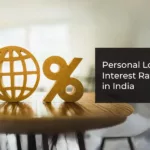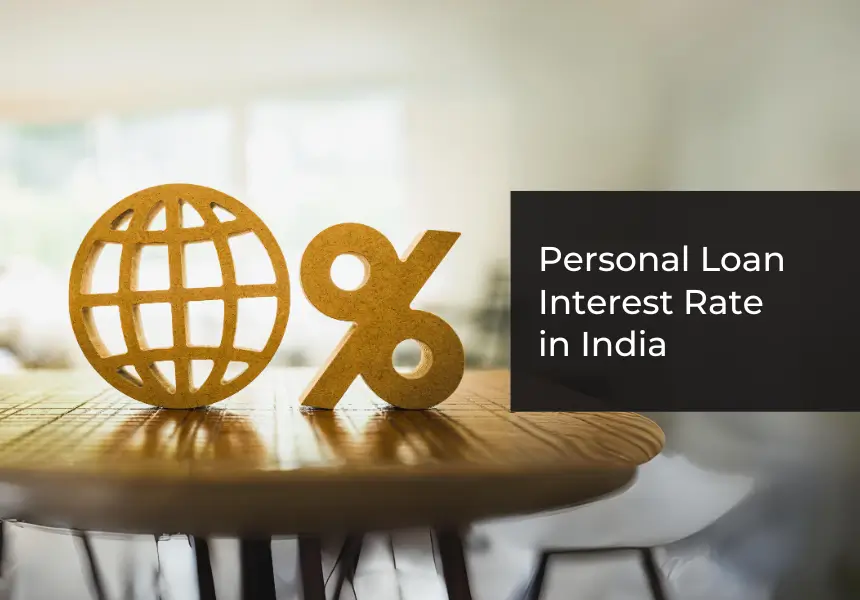
When it comes to availing of a personal loan, most of us focus on interest rates, tenure, and repayment options. But did you know that GST has an important role in determining the overall cost of your loan? Since its introduction in 2017, GST has streamlined indirect taxes in India, bringing uniformity across sectors, including financial services. But how exactly does GST influence your personal loan costs?
Personal loans come with various charges beyond the interest rate, such as processing fees, prepayment penalties, and late payment charges. These costs are subject to GST, which currently stands at 18%. While this may seem minor at first glance, it can significantly increase the overall cost of borrowing, especially for large loans or high-value services.
Below, we have explained the nuances of GST on personal loans, including how it impacts your total loan expenses and tips on how you can manage these additional costs.
What is the Impact of GST on Personal Loans?
Personal loans are a quick way to secure money for any individual use, this could include a wedding, a vacation, or any urgent expense. However, it is important to stay aware of how GST affects the overall cost of borrowing.
1. Processing Fees
When you take a personal loan, the lender charges a processing fee to approve your loan application. In addition to this fee, a GST of 18% is charged to it. For example, if your loan amount is ₹2,00,000 and the processing fee is 2.5%, the fee will be ₹5,000. After adding GST of 18% (₹900), the total processing fee becomes ₹5,900.
2. Prepayment Charges
If you want to repay your loan early, lenders charge a prepayment or foreclosure fee. Since this is a service provided by your lenders, the GST is applicable to it. For instance, if the prepayment charge is 4% on a loan of ₹1,50,000, the fee will be ₹6,000. Adding GST of 18% (₹1,080) brings the total prepayment fee to ₹7,080.
3. Other Fees
GST is also added to other charges like late payment fees, cheque bounce fees, or collection charges. These extra costs can slightly increase the total amount you need to pay. For example, if a late payment penalty is ₹2,500, GST of ₹450 is added, making the total penalty ₹2,950.
4. Interest Payments
GST does not apply to the interest on your loan. Interest is not considered a service, so your EMIs, which include the principal and interest, remain unaffected by GST.
GST makes personal loans a bit more expensive, but the increase is only on service-based charges like processing and prepayment fees. It doesn’t affect your loan’s interest or EMIs. While the extra costs aren’t very high, it’s a good idea to include them in your budget to avoid missing out on any expenses.
What are the Advantages of GST on Personal Loans?
While GST on personal loans is an additional cost to borrowers, it also brings several advantages that promote transparency, efficiency, and simplicity in the lending process. Here are some of the benefits:
1. Standardization and Transparency
GST has introduced a uniform tax structure across the financial sector. This standardization ensures that all financial institutions follow the same tax rules, making the costs associated with personal loans, such as processing fees and other charges, more transparent. Borrowers can easily understand and compare these charges and thereby make more informed decisions.
2. Streamlined Tax System
Before GST, multiple indirect taxes like service tax and VAT added complexity to the financial services sector. GST has replaced these with a single tax, making the overall tax system simple. This clarity helps borrowers understand the tax implications of their loans without getting lost in a maze of varying charges.
3. Simple Procedures
GST has improved the efficiency of tax collection and processing. This streamlining benefits borrowers by making the loan application and disbursement process smoother and less time-consuming. Clearer tax structures reduce ambiguities, enhancing the overall customer experience.
4. Potential Cost Benefits
Although GST increases certain costs, its systematic implementation can lead to operational efficiencies for lenders. These savings may eventually trickle down to borrowers in the form of reduced processing fees or competitive interest rates, offering long-term financial advantages.
What are the Disadvantages of GST on Personal Loans?
While GST has streamlined taxation in India, its application to personal loans comes with certain drawbacks that borrowers should be aware of. Below are few of the disadvantages of GST for personal loans:
1. Increased Initial Costs
GST is levied on processing fees, documentation charges, and other ancillary services related to personal loans. At 18%, it increases the upfront cost of acquiring a loan. For borrowers, especially those seeking high-value loans, this additional expense can make the loan slightly more expensive right.
2. Impact on Loan Affordability
For individuals on tight budgets, the GST-related costs may reduce the affordability of the loan. These added expenses can stretch finances, particularly for borrowers already managing limited resources.
How to Reduce the GST on Personal Loans?
While GST on personal loans cannot be avoided, there are strategies to minimize its impact on your overall borrowing costs. The GST amount you pay is directly tied to fees such as processing charges, prepayment penalties, and other services offered by the lender. By focusing on reducing these fees, you can effectively lower the GST burden. Here’s how:
1. Compare Loan Offers
Before finalizing a personal loan, assess and compare the processing fees and prepayment charges across various lenders. Some lenders offer competitive fee structures that result in lower GST amounts. Conducting a thorough comparison will help you identify the most cost-effective option without compromising on loan features or benefits.
2. Negotiate Fees with the Lender
Although GST rates are fixed, negotiating lower processing fees or choosing lenders with minimal charges can reduce your GST costs. You can also choose lenders that offer low processing fees, late payment penalties, or prepayment charges to make your loan more affordable.
3. Plan Your Finances
Understand all upfront costs, including GST on processing fees, and factor them into your loan budget. Being prepared for these expenses ensures there are no surprises during loan disbursement or repayment.
4. Evaluate Prepayment and Late Payment Policies
Before opting for prepayment, calculate the total cost, including GST on prepayment charges. Similarly, avoid late payments to escape penalties and additional GST.
5. Consult Experts
If you’re unsure about GST implications on your personal loan, seek advice from financial advisors. They can guide you in understanding loan terms and optimizing your borrowing strategy to minimize unnecessary costs.
Summary
GST on personal loans is an integral part of borrowing costs, and while it cannot be avoided, strategic planning can help minimize its impact. By opting for lenders with lower processing fees and prepayment charges, you can reduce the overall cost of your loan. Additionally, comparing various loan offers and understanding all associated charges before applying can go a long way in making an informed and cost-effective decision.
If you’re looking for a personal loan with competitive rates and minimal processing fees, LoanTap offers an excellent solution. Known for its customer-centric approach, LoanTap provides quick and hassle-free personal loans with transparent terms, ensuring that you don’t face unnecessary financial burdens. Whether it’s managing GST or optimizing other costs, LoanTap makes borrowing simpler and more affordable.
When taking a personal loan, remember that informed decisions can save you money in the long run. Opt for a lender that values your financial well-being and ensures your loan journey is smooth and rewarding.
Frequently Asked Questions
Why is there no GST on interest on loans?
Interest on loans is not considered a financial service and is exempt from GST under India’s tax regulations.
How can I calculate GST on processing fees?
To calculate GST on processing fees, multiply the fee amount by 18%. For example, if the processing fee is ₹1,500, GST will be ₹1,500 × 18% = ₹270.
Is GST charged on balance transfer loans?
Yes, GST is applied to charges like processing fees and documentation fees during a balance transfer.
Are GST charges refundable if a personal loan application is rejected?
Lenders usually don’t charge the processing fee upfront; it’s deducted from the loan amount when it’s approved and disbursed. This means GST charges on the processing fee only apply after the loan is approved. So, if your application is rejected, GST charges won’t be an issue. Always check your eligibility before applying to avoid rejection.








